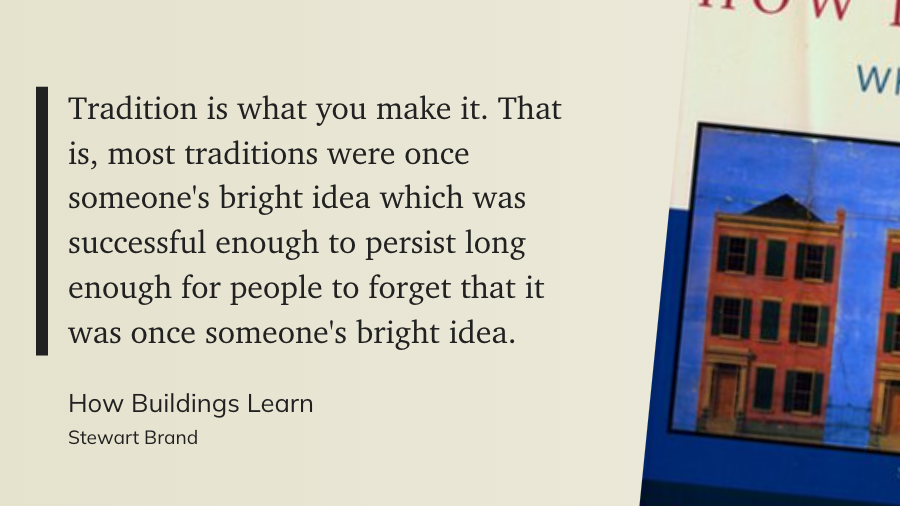Science is organized knowledge. Wisdom is organized life.
— Immanuel Kant
Topic / quotes
22 postsThe circle of the English language has a well-defined centre, but no discernible circumference.
— Sir James Murray
We do not merely study the past: we inherit it, and inheritance brings with it not only the rights of ownership, but the duties of trusteeship. Things fought for & died for should not be idly squandered. For they are the property of others, who are not yet born.
— Roger Scruton , How to Be a Conservative
Out of the quarrel with others we make rhetoric; out of the quarrel with ourselves we make poetry.
— William Butler Yeats

Stewart Brand on tradition.
From How Buildings Learn.
“The preoccupation with what should be is estimable only when the respect for what is has been exhausted.”
—José Ortega y Gasset**
“When you see ten problems rolling down the road, if you don’t do anything, nine of them will roll into a ditch before they get to you.”
—Calvin Coolidge
The circle of the English language has a well-defined centre, but no discernible circumference.
The test of a first-rate intelligence is the ability to hold two opposed ideas in mind at the same time and still retain the ability to function.
—F. Scott Fitzgerald
Simplicity is the hallmark of truth — we should know better, but complexity continues to have a morbid attraction. When you give for an academic audience a lecture that is crystal clear from alpha to omega, your audience feels cheated and leaves the lecture hall commenting to each other: ‘That was rather trivial, wasn’t it.’ The sore truth is that complexity sells better.
—Edsger Djikstra
A gene pool is carved and whittled through generations of ancestral natural selection to fit [a particular] environment. In theory a knowledgeable zoologist, presented with the complete transcript of a genome [the set of all the genes of an organism], should be able to reconstruct the environmental circumstances that did the carving. In this sense the DNA is a coded description of ancestral environments.
—In The Living Wild , Art Wolfe (2000)
(from David Deutsch’s The Beginning of Infinity)
The organism is a key to decoding its environment.
“Institutions will try to preserve the problem to which they are the solution.” — Clay Shirky


Captain Kirk making the case for “muddling through.”
Are They Funny?
August 25, 2023 • #Jerry Seinfeld and McKinsey.
Popper on Great Man Theory
September 27, 2022 • #Great men are actually responsible for more tragic assaults on freedom than they are for human progress.
Ask Fewer Questions
August 16, 2019 • #Advice from Seneca on how to reduce anger.
The Quality of Your Thoughts
March 28, 2019 • #A quote from Marcus Aurelius.
Form Defining Function
February 16, 2017 • #Table Alphabeticall
October 7, 2011 • #Table Alphabeticall.
The Modern World
March 14, 2011 • #GK Chesterton.
Spending Money
November 3, 2010 • #On spending.
The 72-hour Expert
September 22, 2010 • #PJ O'Rourke on his time in Afghanistan.